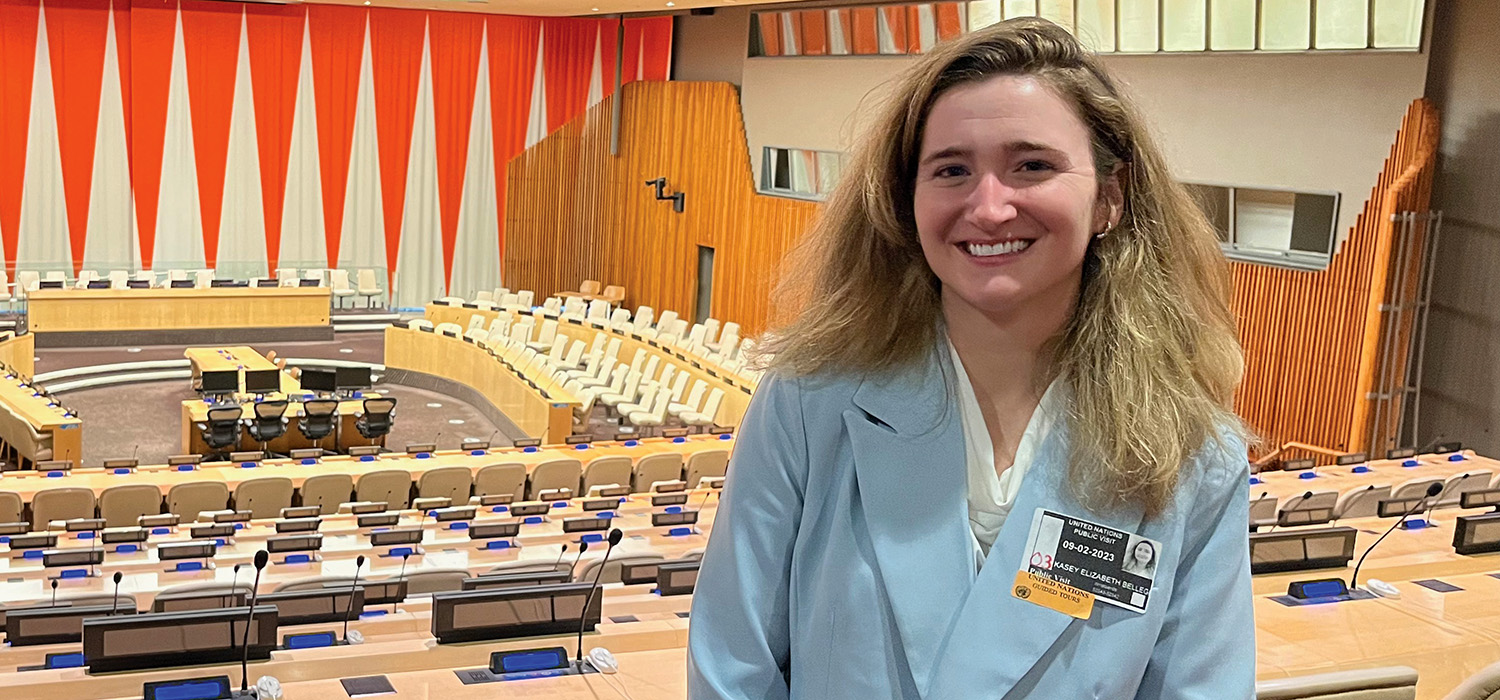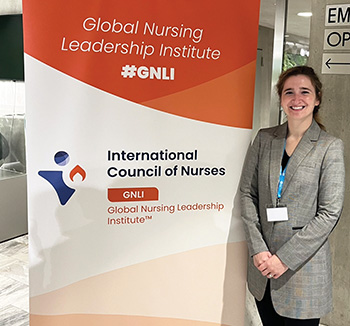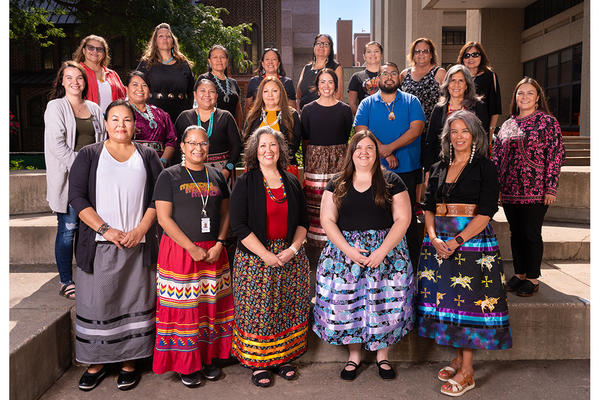Climate crisis sparks nurse innovation
Kasey Bellegarde, DNP ’24, is mobilizing nurses to lead in planetary health as ANA Innovation Lead
November 11, 2024
Susan Maas

Kasey Bellegarde at the United Nations in New York City.
As climate change and its effects worsen, human health is increasingly impacted — and nurses are more crucial than ever. Kasey Bellegarde, DNP ’24, MPH, RN is helping lead the way.

Bellegarde chose the University of Minnesota’s Doctor of Nursing Practice (DNP) program, with a health innovation and leadership specialty, thanks to the school’s focus on planetary health. The ingenuity of nurses is key to mitigating the human health implications of climate change, Bellegarde believes, and to implementing stronger climate policy at every level of government.
The Massachusetts native graduated this spring and is now Innovation Lead at the American Nurses Association. “Planetary health is health for everything,” Bellegarde says, and the climate crisis demands new ways of thinking and acting. “We need to change our values, the ways that we work and the ways that we think, the ways we consume, all of it. It’s really hard to change the ways we do things.
“Innovation asks us to do this differently, or to do things in a new way. The more we can incubate and support nurses’ ideas for innovation, it will be transformative for patients and communities,” she continues. “How can we mobilize the power of nurses? How do we activate this spirit of innovation and confidence to support communities and the planet?”
Mobilizing ‘the power of nurses’
Bellegarde has been a nurse, mostly in public health, for over a decade. After earning a master’s degree in public health at Johns Hopkins University in 2016 and serving in city and county health departments, she accepted a position in Colorado with the Nurse Family Partnership program. “It’s a national, evidence-based, nurse-led home visitation program for first-time, low-income parents,” she explains, where innovation was encouraged.
Among the challenges Bellegarde saw routinely was the disproportionate harm to low-income people — especially mothers and children — caused by climate change. Having just had her first child this summer, that’s on her mind even more. “I think all the time about my pregnant mamas who would walk to the bus stop to get to their OB appointments on really hot days,” Bellegarde says. “There’s planning that we can do around those extreme heat days: Can I see if someone can drive me? Or can I bring some extra water, and take breaks, and take the shady route?
“Or if it’s a poor air quality day, mom and baby can play inside instead of outside. Or if flooding is a risk for us—what would we do? How can we have some extra medication on hand in case of an emergency?” Bellegarde convened a group of Colorado-based nurses who were interested in the intersection of climate and maternal-child health and wanted to do something about it.
Making health care climate friendly
Besides helping patients minimize their own, and their families’, vulnerability to climate change, nurses can lighten health care’s climate footprint, Bellegarde says. “We have so many single-use supplies. We create so much linen and other types of waste and it really adds up.”
One of Bellegarde’s DNP projects, in partnership with Project Drawdown, was creating a climate action resource guide for nurses to highlight opportunities to drive down carbon emissions in health care. “The U of M School of Nursing is unique in that it’s been at the forefront of bringing that climate focus into nursing education,” Bellegarde says. During her program, she was also chosen as a U of M delegate to the 27th Conference of the Parties to the United Nations Framework Convention on Climate Change in Egypt — an experience Bellegarde calls an honor.
“So much of what patients and communities are experiencing is shaped by climate policy at all levels. Climate policy is maternal-child health policy,” Bellegarde says. “I wanted to understand, what do those negotiations sound like? Are they talking about health impacts?” And while Bellegarde was disheartened to see fossil fuels delegates outnumbering advocates from climate-impacted countries, she’s heartened by the potential for nurses to play a bigger advocacy role in climate policy discussions.
“Nurses bring that human face. It’s like, ‘I can tell you about this patient I saw yesterday, with this particular health issue. Here’s how it connects back to a decision you’re making right now.’”
At the ANA, Bellegarde works with another DNP alum: Oriana Beaudet, DNP ’17, RN, FAAN, who’s the association’s vice president for innovation. They’ve known each other for several years; for the past three, Bellegarde served on the ANA’s Innovation Advisory Committee on Planetary and Global Health Committee (ultimately becoming its chair).
Innovation, broadly defined
Innovation, she’s quick to say, doesn’t necessarily mean using fancy or expensive new technology. “It’s not just, what’s the latest device on the market. That’s important, and it’s also community health. It’s sometimes about, remembering what we used to know, remembering that way of doing something that we moved away from because we’ve gotten caught up by systems that are harming people.“
Last year, Bellegarde was chosen as a Global Nursing Leadership Institute Scholar with the International Council of Nurses. Through that program, she participated in a weeklong intensive in Geneva, during which she helped facilitate a lunch meeting with the head of Climate and Health at the World Health Organization. And she was recently appointed to be a fellow of the Faculty of Nursing and Midwifery at the Royal College of Surgeons in Dublin.
“Advocacy is core to nursing. We have to change our systems that are not working, that are actively harming people, as if our lives depend on it and the life of the planet depends on it,” Bellegarde says. “It’s something that nurses are uniquely well positioned for.”

